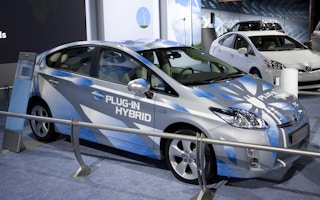The Volkswagen diesel emissions test rigging scandal could accelerate a shift towards gasoline-electric hybrid cars and plug-in electric hybrids - even as cheaper gasoline, for now, saps demand for green cars.
The fallout from VW - where the cost of the scandal pushed the German automaker to a first quarterly loss in at least 15 years - is rippling through an industry already embracing alternative ‘greener’ propulsion systems to traditional gasoline and diesel.
Diesel technology, which had been seen, especially among European carmakers, as a mainstream solution to helping the industry meet tougher fuel economy and emissions regulations, now looks vulnerable - though it’s far from finished.
“Anybody can, with certainty, guess what’s going to happen … This (VW) scandal is not going to make diesel more popular in the United States. This scandal is not going to make diesel more popular in Japan,” Nissan Motor CEO Carlos Ghosn told reporters on Wednesday on the opening day of the Tokyo Motor Show.
With diesel potentially falling out of favour, automakers and their technology suppliers will likely turn to non-diesel solutions in a stricter regulatory environment.
Over the next five years and beyond, auto industry officials see hybrid technology - especially heavily electrified plug-in hybrid know-how - emerging more into the mainstream. Volkswagen itself is now looking closer at long-range plug-in hybrids and electric vehicles as it seeks to put the scandal behind it.
“If you take out diesel as a key solution …, initially conventional hybrid technology, and then plug-in hybrids, will have to be used to fill the gap,” said a person close to AVL, a privately-owned global powertrain specialist. “Beyond 2020, hydrogen fuel-cell cars will have to play a greater role.”
Humming along
That would go down well in Japan, where Prime Minister Shinzo Abe is pushing for a so-called ‘hydrogen society’, with the zero-emission fuel powering homes and cars.
Honda Motor operating officer Toshihiro Mibe says hydrogen fuel-cell cars - including the company’s first mass market model unveiled at the Tokyo show on Wednesday - are quietly gaining momentum.
“Beyond 2020, we think diesel is not going to play a role at all in meeting fuel economy and emissions regulations,” he told Reuters. “Electrification is costly technology to pursue, but manufacturing costs … are coming down fast and we will hit a point soon where costs for electrified cars will be cheaper than for diesel cars.”
Any broader shift to plug-in hybrid technology will likely benefit automakers like Toyota Motor and General Motors , which are already up and running with plug-in hybrids, such as the Prius variant and Chevrolet Volt on the market.
“We believe hybrid cars’ competitiveness might gain a lot more steam as a consequence of the VW scandal,” a senior Toyota executive told Reuters. “People who bought VW diesel cars in the US are highly environmentally conscious. We hope (they) would switch to hybrids when they replace their diesel cars.”
Similarly, as consumers turn to tried and trusted models, electrification parts suppliers such as Denso, Aisin , Bosch, Valeo, Delphi, LG Electronics, Panasonic, Continental and Visteon stand to gain business.
“
Beyond 2020, we think diesel is not going to play a role at all in meeting fuel economy and emissions regulations.
Toshihiro Mibe, Honda Motor operating officer
Shifting trends
All-electric battery cars will likely be less prominent, industry experts say, because of their limited driving range and cumbersome re-charging.
In the shorter term, to meet regulatory requirements through to around 2018, conventional gas-electric hybrids, as opposed to plug-ins, should prove highly useful, experts added, as will be other fuel-saving technologies such as turbo-charging and ignition shut-on-and-off systems.
“Shorter run, we would see a continued downsizing of gasoline engines using turbo charging. We would also see more direct injection of fuel, more 3-cylinder and even 2-cylinder engines …,” the person close to AVL said.
But, with so much invested in capacity to produce diesel engines, industry executives aren’t writing off the technology just yet.
“We still believe in the future of diesel engines because they are in the trade-off of emissions and CO2, they are a very good option for many vehicles,” VW brand CEO Herbert Diess told reporters at the Tokyo show.
Koei Saga, Toyota senior managing officer for powertrain technology, reckons diesel technology still has a role to play, especially in powering cars and trucks sold in emerging markets in Asia, South America and Africa, where affordability and fuel economy are key.
As regulations and testing methods become more stringent in developed markets, diesel technology would have to advance significantly, making it as expensive to make diesel-fuelled cars as gasoline-electric hybrids.
“It’s hard to see diesel becoming a mainstream solution,” Saga told Reuters.










